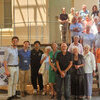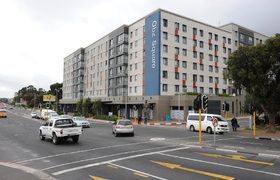UCT opens new strategic conference venue
08 August 2025 | Story Myolisi Gophe. Photos Lerato Maduna. Read time 3 min.
University of Cape Town (UCT) Vice-Chancellor (VC) Professor Mosa Moshabela celebrated his first anniversary at the helm of the institution in style by cutting the ribbon to officially unveil a brand-new conference venue.
The celebration on Friday, 1 August, marked more than a personal milestone – it heralded another significant chapter in UCT’s strategic partnerships, innovation, and community engagement.
The venue, a versatile addition to the Protea Hotel Mowbray, was born out of a creative partnership between UCT and the hospitality industry, leading to three rooms being refurbished into a conference setting. It is expected to serve as an accessible location for academic gatherings, strategic meetings, innovation summits, and community events, adding a critical node to the university’s network of convening spaces across Cape Town.
A new era of partnership and purpose
“As a university, we have the honour and privilege of getting into strategic partnerships,” said Professor Moshabela, addressing guests “Some people think that all we do is teach, educate and graduate students. But we also need facilities and infrastructure for students to conduct research and engage with stakeholders so that the knowledge we produce can impact society and the world.
“While we might contribute by getting young people into the markets and preparing them for their careers, we have been asked to contribute to this project of economic growth.”
In his keynote remarks, Moshabela said UCT should use its strong legacy and global reputation to the best of its ability to make the world a better place. The university has been asked by the national and provincial governments to also actively participate in advancing economic growth. “There are a lot of socioeconomic challenges in our society. There is a lot of unemployment, poverty, inequality and crime. While we might contribute by getting young people into the markets and preparing them for their careers, we have been asked to contribute to this project of economic growth. That is one of the reasons we’ve taken a strategic decision to partner with the [hospitality] industry to create spaces like this. Not just for conferences, but for constructing spaces that contribute a lot to job creation.”
Creating space for innovation and community impact
He noted that UCT’s institutional missions have expanded beyond the traditional three of teaching, research, and societal impact. “We’ve now embraced a fourth mission: innovation. And that requires a triple helix – government, industry, and academia – working together. On our own, we simply can’t achieve what the country and the continent need from us.”
“This venue is not just a beautiful space – it’s a product of trust, creativity, and shared vision.”
Colin Naicker, the general manager of the hotel, echoed the theme of partnership. “My goal today is simple: to be your trusted partner for travel and meeting space in Cape Town,” he told guests. “This venue is not just a beautiful space – it’s a product of trust, creativity, and shared vision. I’m incredibly proud of what our team has achieved. It took vision and grit to turn this into a venue ready to serve not just UCT, but the wider community.”
Thobile Dlamini, UCT’s director of hospitality, noted that the venue plays a strategic role in UCT’s Vision 2030. “This addition is a significant step towards our sustainability goals. It helps generate income that supports the university’s core mission, and it stands as a testament to what we can achieve when we think creatively about institutional resilience,” she said. “Renovating while keeping a hotel operational is no small task. It took commitment, collaboration, and a belief that the outcome would matter – not just now, but for future generations.”
 This work is licensed under a Creative Commons Attribution-NoDerivatives 4.0 International License.
This work is licensed under a Creative Commons Attribution-NoDerivatives 4.0 International License.
Please view the republishing articles page for more information.














